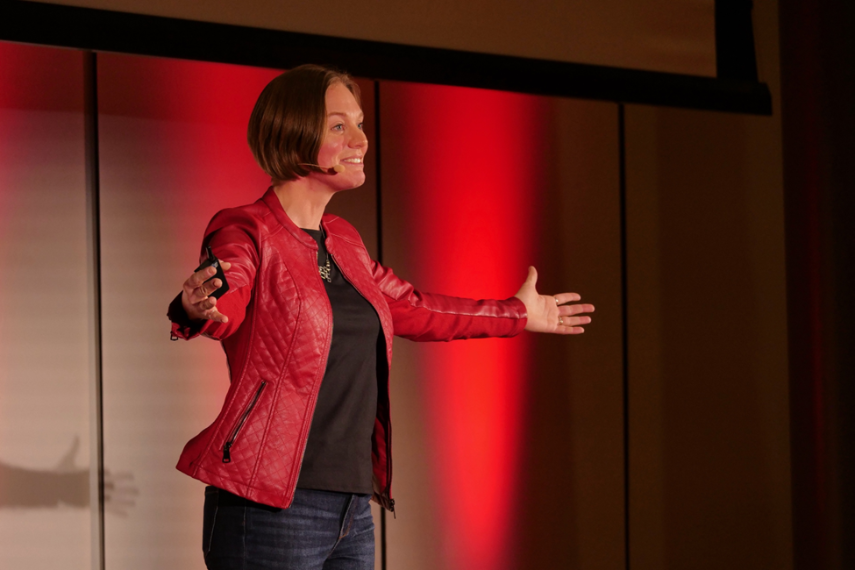Guelph Engineer asks: “What if we didn’t have to be ‘one of the guys’?

In celebration of International Women in Engineering Day, we connected with U of G engineering graduate Emily Nichols to hear her thoughts on being ‘one of the guys.’
In a TEDx talk delivered recently in Hamilton, Ontario, Nichols used her experiences in engineering, manufacturing, agriculture, and professional speaking to challenge stereotypes around gender norms and ask: What if we didn’t have to be ‘one of the guys’? The professional engineer says embracing gender-neutral language is one small step everyone can take toward a more inclusive and equitable society.
Nichols graduated twenty years ago from the University of Guelph’s B.Sc. (Eng) program and was one of few women in the Engineering Systems and Computing stream. She says it was no big deal. She expected equal treatment, and for the most part, she got it.
Academically, Nichols excelled at Guelph. In March 2000, she was one of 25 students nationwide to be selected for the prestigious Women in Engineering and Science (WES) program of the National Research Council (NRC) of Canada. The award guaranteed her three semesters of placements in an NRC lab. Nichols chose the Institute for Research in Construction (IRC) in Ottawa for her first term and the Institute for Manufacturing Technology (IMTI) in London for the remaining two.
After graduation, she continued working in the manufacturing sector – first at PepsiCo Foods Canada (Quaker Oats, Peterborough), and later at Casco (now Ingredion, London) and Cogent Power (now JFE, Burlington). Despite having received such a notable award, Nichols never mentioned it at work. Instead, she worked hard to be considered ‘one of the guys.’ “I wanted to be recognized and rewarded for my good work, and not seen as different, or even worse, ‘the diversity hire,’ she says. “One production employee shared that at first, the guys on the shop floor weren’t sure what to think about a woman engineer. Then somebody noticed the streak of purple in my hair, and they figured I must be all right.”
In 2009, when Nichols applied to the master’s degree program (chemical engineering) at McMaster University, she called upon U of G professors Dr. Bob Dony and Dr. Valerie Davidson to provide references. “It was amazing to have their support, so long after graduation.” And it wouldn’t be the last time. In 2012, Nichols was honoured as Guelph’s ‘Engineering Young Alumnus of the Year’, having been nominated by Dr. Davidson and Dr. John MacGregor of McMaster University. (MacGregor was Nichols’ graduate studies supervisor and the founder of ProSensus, Inc., where Nichols worked after she earned her master’s degree.)
Meanwhile, her thoughts on being ‘one of the guys’ were starting to evolve. “The influence of Dr. Davidson over the years was a catalyst,” she says. “Dr. Davidson was doing all these things to support women in engineering, recruit more women into engineering, and I was still doing my best to be ‘one of the guys.’ I started to feel like I should be doing more for the cause.” In 2016, Nichols was able to create positive change. Then a senior leader in manufacturing, Nichols began hiring women into production roles, in a company where those roles had traditionally been filled by men. Several years later, many of those women have moved from general labour jobs into more specialized, technical positions. “I hear about their successes through the grapevine,” says Nichols. “It makes me smile.”
As for Nichols herself, she has made a move too – into professional speaking. Her keynotes and workshops address ‘Human Skills for Technical People.’ “With so many tech courses to complete, the human skills – things like communication, collaboration, creativity – get squeezed out of technical educations. And employers are looking for those.
Nichols developed some of her human skills at U of G – presentation skills and teamwork, for example. In manufacturing she honed other skills, like the ability to ask skillful questions that don’t put people on the defensive. “It’s absolutely critical on the shop floor,” Nichols says. “Your ability to solve a problem quickly depends on your ability to collect all the relevant information. And for that, you need to people trust you, trust that you’ll listen, and not jump to conclusions or ‘call them out.’
Engineering to professional speaking may seem like an unusual transition, but speaking has been a part of Nichols’ career all along. Even in her first manufacturing job, she taught continuous improvement workshops at various plants in the PepsiCo network. Plus, she loves entertaining people. Nichols’ bio says, “She summarized her master’s thesis in five Dr. Seuss rhymes.” When asked Nichols explained, “I wrote them into the draft for fun, one at the start of each chapter. Dr. MacGregor didn’t tell me to take them out, so they stayed.”
Today as we recognize the pursuits of millions of women around the world in Engineering, Nichols’ journey from U of G to practicing engineer, to professional speaker, is a testament to life’s twists and turns. Her self-discovery led Nichols to a place where she’s comfortable speaking up to challenge gender norms – even on a global platform like TEDx – and promoting the power of language to create a more inclusive society in all professions.
Watch Emily’s TEDx talk or visit emilynichols.com.